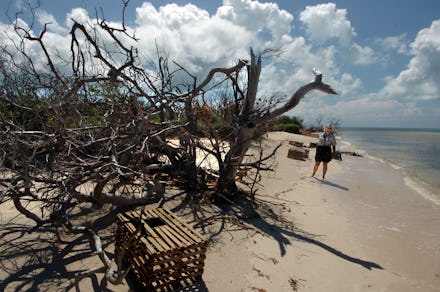Florida Has Finally Found a Way to "Solve" Climate Change

Environmentalists, you can relax: Florida Gov. Rick Scott's Department of Environmental Protection has permanently solved the problem of global climate change.
By banning all mention of it.
According to a new investigation conducted by the Florida Center for Investigative Reporting, since 2011 the department has been strenuously following an unwritten policy of never mentioning the terms "global warming" or "climate change" during official business.
Instead, former DEP staffer Kristina Trotta told the FCIR, employees "were told that we were not allowed to discuss anything that was not a true fact." A former DEP attorney who worked in Miami, Christopher Byrd, told the FCIR, "We were told not to use the terms 'climate change,' 'global warming' or 'sustainability.' That message was communicated to me and my colleagues by our superiors in the Office of General Counsel."
Other employees noted that the terms' ban came from above. They also claimed that under Scott, the DEP suppressed research on climate change's impact on Florida's environment and discouraged staffers from using the terms in official documents.
"We were told not to use the term 'climate change,'" Miami nature writer Jim Harper told the FCIR about a project on coral reef protection fact sheets. "The employees were so skittish they wouldn't even talk about it."
DEP Communications Director Lauren Engel told Mic that the claims in the FCIR report are "not true." Similarly, Gov. Scott issued a statement to media saying that there is no such policy at DEP.
Out of sight, out of mind, problem solved: As the Pulp's Chris Joseph writes, this policy shouldn't be surprising. Scott has an "abysmal environmental record," from saying the science behind climate change isn't convincing enough to claiming he's not a scientist and so cannot speak on the topic when pushed on the issue.
Despite the concern that huge stretches of Florida could be underwater by the year 2100 if global carbon dioxide emissions aren't curbed, and that climate change poses catastrophic risks to the state's precious beaches and the Everglades, Scott has seemed curiously impervious to warnings.
Following a 2014 meeting with five climate scientists in which Scott appeared to be less than engaged, University of Miami atmospheric science expert Ben Kirtman told ThinkProgress, "We didn't have that kind of discussion where there's this important give and take that's associated with actually, from my experience, absorbing the information. I don't honestly believe the governor is climate literate, and I don't think he is particularly interested in becoming climate literate."
David Hastings, a marine sciences and chemistry expert at Eckerd College who was one of the five scientists who met with Scott, told Mic that the FCIR report is a "very bad sign."
"When I first saw it, I thought it came out of the Onion. It is absurd," he said. "I'm tired of Florida being the brunt of jokes, and this is obviously not a joke, and it's so, so out of the the norm that it's almost unimaginable. It's almost Orwellian."
"It's unacceptable," Hastings added. "It also reflects the fact that they aren't taking this very important problem seriously. We all know Florida is ground zero for climate change. This is where the climate change impacts are going to be felt first."
In September, the Tampa Bay Times proclaimed Scott's environmental record a "disaster," saying that he "bulldozed a record of environmental protection that his Republican and Democratic predecessors spent decades building."
Scott cut enforcement actions, killed programs to inspect septic tanks and restore the state's springs, appointed lobbyists and developers to water management boards and "decimated" the office responsible for buying and protecting endangered land.
A national problem: The allegations raised by FCIR aren't unique to Scott or Florida. Nationally, many Republican politicians have actively denied the science behind climate change and refused to acknowledge the risks of global warming while making policy.
In one extreme example, Oklahoma Sen. James Inhofe tossed a snowball onto the Senate floor to make the point that it was too cold outside for global warming to be real.
Only eight states have congressional delegations without members who deny climate change, despite being something agreed upon in up to 97% of relevant scientific studies.
Ignoring climate change won't make it go away - it will make it worse. Low-lying, seaside Florida is uniquely at risk from risks like rising sea levels that are already here, and people like Scott can only deflect responsibility for so long.
"We should be preparing for the impacts of sea level rise. We should be preparing for sea level rise and stronger storms. We should be preparing for our drinking water being contaminated with sea water," said Hastings. "If state agencies can't use the word[s] 'climate change,' how can we prepare for that?"
"I think it's possible for them to do good work, but it certainly reflects the climate in those government offices that is not conductive to taking these issues seriously," he said. "It is certainly not healthy and it is very dangerous."
Updated: March 10, 2015, 11:58 a.m.